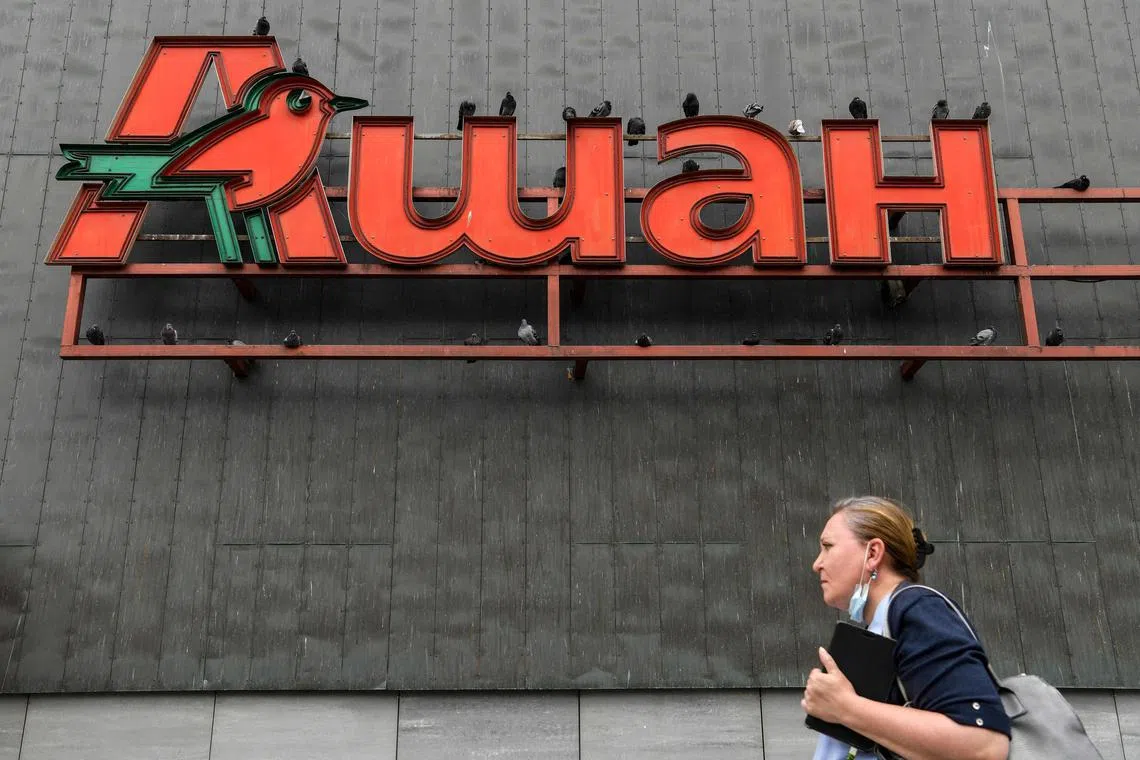Leave Russia? A year later, many companies can’t or won’t
Sign up now: Get ST's newsletters delivered to your inbox

Auchan, one of France’s largest supermarket chains, has kept its 230 stores in Russia open and says it intends to stay.
PHOTO: AFP
PARIS – When Russia invaded Ukraine, dismantled its golden arches after 32 years. BP moved to divest its mammoth Russian investments.
But a year into the war, hundreds of Western businesses are still in Russia, including blue-chip and mid-sized companies from Europe and the United States. They are doing business despite Western sanctions and boisterous boycott campaigns pressed by Ukrainian officials, consumers and human rights groups.
Some companies, facing claims that they are helping finance Russia’s aggression, say they are staying because their customers need them. Among them is Auchan, one of France’s largest supermarket chains, which has kept its 230 stores in Russia open and says it intends to stay. The retailer has drawn the ire of Ukraine’s President Volodymyr Zelensky and recently faced fresh boycott calls after a report that Auchan’s Russian subsidiary supplied donated food to the country’s military.
Auchan has denied those allegations but is unapologetic about remaining in Russia and Ukraine, where it also has stores, to “meet the essential food needs of the civilian populations”.
Other companies have scaled back their Russia operations, or their exitss, announced last spring, have stalled.
Pharmaceutical giant Pfizer has stopped investing in Russia but continues to sell a limited range of products, with the profits sent to Ukrainian humanitarian groups. Carlsberg is trying to find a buyer for its Russian breweries that would offer buyback clauses to allow the company to return when the war ended.
For many companies, extraction from Russia has been trickier than expected. Moscow has tied their hands, they say, by brandishing the threat of nationalisation and other obstacles. Western corporate chiefs frequently say they have a responsibility to shareholders to find buyers that provide some value for billions in assets, rather than surrender them to Moscow. Such concerns prompted tobacco giant Philip Morris to say last month that it might never sell its Russian business, despite efforts to do so.
Others do not want to risk surrendering market share to companies from China, Turkey, India or Latin America, whose governments are not part of the sanctions regime, and are eyeing properties and equity stakes left by departing Western firms.
Data compiled by Yale showed that of nearly 1,600 companies in Russia pre-war, over one-quarter had continued to operate fully there, with some only postponing planned investments. In a survey of twice as many firms, by the Kyiv School of Economics, that proportion was closer to 50 per cent.
But another study suggests how few have fully cut ties, finding that below 9 per cent of about 1,400 firms from Europe, the US, Japan, Britain and Canada had divested a Russian subsidiary since the war. Those that did accounted for a small share of the Western business footprint, which the report said called into question the willingness of Western firms to leave.
Despite their sabre-rattling, the Russian authorities are concerned about limiting the economic hit from sanctions and preserving hundreds of thousands of jobs, and would prefer not to see Western investors exit, said Mr Dimitri Lavrov, a senior partner at NexLaw, a Geneva law firm that counsels multinationals in Russia.
A draft Bill circulating in the Duma, Russia’s Lower House of Parliament, would allow foreign investors “to preserve both their assets and the actual presence of their business in the country, and the possibility of returning to Russia in case of forced withdrawal”, Mr Lavrov added.
Auchan offers a window into the complications faced by Western firms. Since the war, the privately held company has insisted that keeping its stores open in Russia was necessary to provide food for its civilian customers and keep its 29,000 workers employed.
Auchan said it halted investments into Russia immediately after the war, leaving the Russian subsidiary a separate, self-sustaining entity. Closing the business, which generated €3.2 billion (S$4.6 billion) in sales in 2021, or 10 per cent of Auchan’s revenue, would have been considered a bankruptcy by Russian officials, the company said, leading to a potential prosecution of local managers and the seizure of hundreds of supermarkets in which it had invested more than 20 years.
This has not assuaged Ukrainian officials, who say Auchan and other companies help fund Russia’s war by continuing to operate there. Ukraine’s Foreign Minister Dmytro Kuleba recently accused Auchan on Twitter of having “evolved into a full-fledged weapon of Russian aggression”, after an investigation by French daily Le Monde revealed that some Auchan employees in Russia collected donated goods that were then sent to Russian troops fighting Ukraine.
Auchan said it has done an internal investigation and that the characterisation of the findings is misleading. It said its presence in Russia is not helping to perpetuate the invasion. “Our business is to feed the population and to be close to the population,” said Auchan spokesman Antoine Pernod. “Because one day, peace will arrive, and it will be important to still be at their side.” NYTIMES


